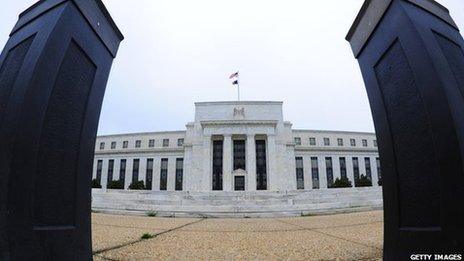The end of free money?
- Published
- comments

The US Federal Reserve has announced a slowdown in its effort to boost the US economy
Is the beginning of the end of this unique era of almost free money good or bad for us?
It is hardly the end of the era of cheap money.
The US central bank will still be buying US government debt and mortgage bonds at a rate of $75bn a month, down from $85bn.
And the US Federal Reserve also made clear it expects its policy interest rate, the Fed Funds Rate, to be as close to zero as makes very little difference for many months and probably years.
But, barring major bumps in the road, the Fed is embarking on a very slow journey towards a world in which risk is priced according to the normal rules, in which interest rates are at more conventional levels.
And of course, if that journey of money becoming pricier is begun in the world's largest economy, America, the rest of the world will be pulled along, perhaps not always happily, but inevitably.
Indeed, although the Bank of England does not want to increase its policy rate any time soon, and has no intention at this juncture of sucking any of the £375bn of new money it has created back from the British economy, market-based interest rates have been rising for much of the year - as investors have bet on eventual normalisation of monetary conditions.
Although this will scare heavily indebted households and businesses - and will even cause some anxiety among governments like America's and the UK's with their huge debt burdens and substantial continuing borrowing needs - the start of the journey is a benign augury.
That is because it reflects a growing confidence, among central banks and investors, that the long years of economic stagnation since the great crash and recession of 2008 are finally ending.
The recovery is manifest in the most positive way in both Britain and the US, in falling unemployment - and as it happens, today's British employment stats were the best in years.
But our economies and financial markets have been hooked on the drug of cheap money for longer than at any time in history.
And we simply don't know whether cold turkey will be simply uncomfortable or accompanied by periodic seizures.
What we do know is that dependence on free money forever would eventually undermine confidence in our ability and willingness to honour our debts, in the credibility of our respective currencies.
Or to put it another way, the expansion of bank balance sheets, the pace of money creation, could not continue at breakneck speed sine die.
And if it isn't to slowdown now, with some momentum at last behind economic growth, when exactly would it end?